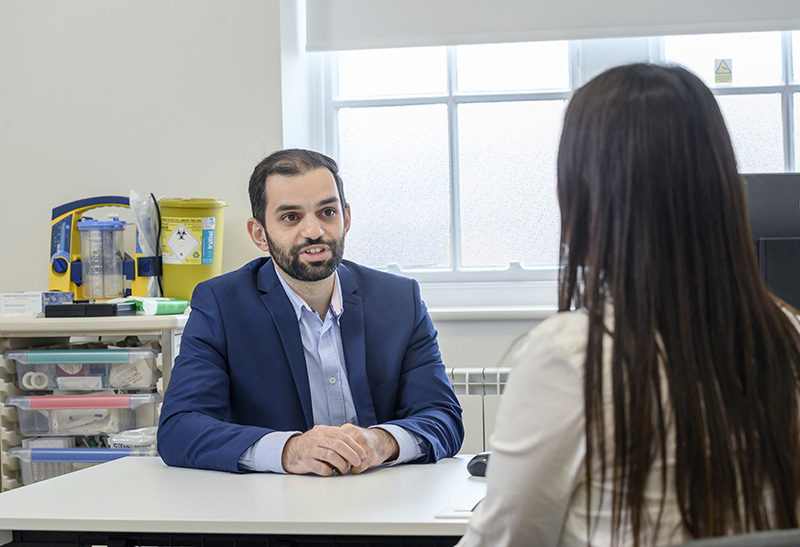Contents
Ulcers

Ulcers are painful sores that develop in the lining of the stomach, small intestine, or oesophagus due to excess stomach acid, bacterial infection, or long-term medication use. If left untreated, ulcers can lead to serious complications such as internal bleeding, perforation, or chronic pain. At The New Foscote Hospital, our expert team provides comprehensive diagnosis, effective treatments, and personalised care plans to help you recover quickly and prevent future issues.
What are Ulcers?
Ulcers occur when the protective lining of the digestive tract is weakened, allowing stomach acid to damage the tissue underneath. The most common types include:
- Oesophageal Ulcers – Occur in the oesophagus due to acid reflux or chronic irritation.
- Gastric Ulcers – Develop in the stomach lining.
- Duodenal Ulcers – Form in the upper part of the small intestine (duodenum).
Causes & Risk Factors
Several factors can contribute to ulcer development, including:
- Helicobacter pylori (H. pylori) infection – A common bacterial infection that weakens the stomach lining.
- Long-term use of NSAIDs – Painkillers like ibuprofen and aspirin can erode the stomach lining.
- Excess stomach acid production – Caused by stress, spicy foods, or excessive alcohol consumption.
- Smoking & heavy alcohol use – Increase acid production and slow ulcer healing.
- Chronic acid reflux (GORD) – Can lead to oesophageal ulcers.
If you have persistent digestive discomfort, early diagnosis is key to preventing complications.
Symptoms of Ulcers
Accurate diagnosis is crucial for effective treatment. Our hospital provides advanced diagnostic tests to assess acid reflux Symptoms can range from mild to severe, depending on the ulcer’s size and location. Common signs include:
- Burning stomach pain – Often worse on an empty stomach or at night.
- Indigestion & bloating – Feeling full quickly, even after small meals.
- Nausea or vomiting – Sometimes with blood if the ulcer is bleeding.
- Unexplained weight loss – Due to appetite changes or difficulty eating.
- Dark, tar-like stools – A sign of internal bleeding from an ulcer.
If you experience severe or persistent symptoms, it’s essential to seek medical attention promptly.
Diagnosing Ulcers at The New Foscote Hospital
GORD treatment focuses on reducing symptoms, preventing complications, and improving your quality of life. We offer a Our hospital offers cutting-edge diagnostic tools to accurately identify ulcers and their causes:
- Gastroscopy (Endoscopy) – A thin, flexible camera examines the stomach and intestines for ulcers.
- H. pylori Testing – Breath, blood, or stool tests detect bacterial infection.
- Barium Swallow X-Ray – Helps identify ulcers or abnormalities in the upper digestive tract.
- Stomach Acid Tests – Assess acid levels that may contribute to ulcer formation.
Following a diagnosis, our specialists will develop a personalised treatment plan suited to your condition.
Ulcer Treatment Options
Our approach to ulcer treatment focuses on relieving symptoms, promoting healing, and preventing recurrence.
1. Medication-Based Treatment
- Proton Pump Inhibitors (PPIs) – Reduce stomach acid to allow healing.
- H2 Receptor Blockers – Lower acid production to ease symptoms.
- Antibiotics for H. pylori – If a bacterial infection is present.
- Antacids – Provide quick relief by neutralising stomach acid.
2. Lifestyle & Dietary Adjustments
- Avoid spicy, acidic, and fatty foods that irritate ulcers.
- Eat smaller, more frequent meals instead of large portions.
- Limit alcohol and caffeine, which increase acid production.
- Stop smoking, as it slows ulcer healing.
- Reduce stress, which can worsen symptoms.
3. Advanced & Surgical Options
In rare cases where ulcers cause severe complications, surgical intervention may be required:
- Endoscopic Treatment – Stops internal bleeding or removes damaged tissue.
- Surgical Repair – For perforated ulcers or obstructions.
Our specialists will assess whether non-surgical treatments are effective before considering advanced procedures.
Arranging To Visit A Private GP

If you are experiencing symptoms of ulcers, early intervention is essential. Our private GP service provides quick access to specialist care, diagnostic tests, and personalised treatment plans.
- Same-day appointments available
- No need to be registered with the hospital
- Private GP consultation: £100 for 30 minutes
- Direct billing available for insured patients
28 March 2025


